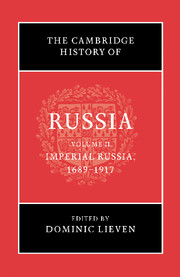Book contents
- Frontmatter
- Introduction
- Part I Empire
- Part II Culture, Ideas, Identities
- Part III Non-Russian Nationalities
- Part IV Russian Society, Law and Economy
- Part V Government
- Part VI Foreign Policy and the Armed Forces
- 23 Peter the Great and the Northern War
- 24 Russian foreign policy, 1725–1815
- 25 The imperial army
- 26 Russian foreign policy: 1815–1917
- 27 The navy in 1900: imperialism, technology and class war
- Part VII Reform, War and Revolution
- Bibliography
- Index
- Map 5. The Russian Empire (1913). From Archie Brown, Michael Kaser, and G. S. Smith (eds.) Cambridge Encyclopedia of Russia 1982.">
- Plate Section">
- References
24 - Russian foreign policy, 1725–1815
from Part VI - Foreign Policy and the Armed Forces
Published online by Cambridge University Press: 28 March 2008
- Frontmatter
- Introduction
- Part I Empire
- Part II Culture, Ideas, Identities
- Part III Non-Russian Nationalities
- Part IV Russian Society, Law and Economy
- Part V Government
- Part VI Foreign Policy and the Armed Forces
- 23 Peter the Great and the Northern War
- 24 Russian foreign policy, 1725–1815
- 25 The imperial army
- 26 Russian foreign policy: 1815–1917
- 27 The navy in 1900: imperialism, technology and class war
- Part VII Reform, War and Revolution
- Bibliography
- Index
- Map 5. The Russian Empire (1913). From Archie Brown, Michael Kaser, and G. S. Smith (eds.) Cambridge Encyclopedia of Russia 1982.">
- Plate Section">
- References
Summary
In Russian foreign policy in the era, certain basic generalisations apply: Peter I had dealt remarkably successfully with the Swedish challenge; he had devised a novel and rather satisfactory solution for the Polish problem; but he had failed to resolve satisfactorily the issue of the Ottoman Empire, a challenge for the future. Moreover, these three sensitive areas were so inextricably interdependent in Russian foreign policy that St Petersburg could not isolate them from each other and deal with them separately. A crisis in any one of the three states almost invariably involved complications with the others. The coming of the French Revolution magnified these problems, and the coming of Napoleon Bonaparte to some extent supplanted them by grander geostrategic challenges.
Era of palace revolutions
The first period following Peter’s reign was most conspicuous for the instability of the throne and the resultant inconsequence that it inflicted on Russian foreign policy. The diplomatic chancery of the time was not by any means in incompetent hands; it simply lacked the constancy of government support to give it proper effect.
The early post-Petrine era exhibited clear elements of the continuity of Peter’s policy in foreign affairs. The most significant such element was the continuation of Russian policy in the experienced hands of Vice-Chancellor Andrei Ostermann. From the days of the Habsburg-Valois – subsequently Habsburg-Bourbon (1589) – rivalry, France had cultivated the favour of the East European border states hostile to Habsburg Austria, and the rise of Russia naturally threatened these border states and therefore French interests in Eastern Europe. In the circumstances, Ostermann defined Russian policy naturally by forming an Austrian alliance hostile to France.
Keywords
- Type
- Chapter
- Information
- The Cambridge History of Russia , pp. 504 - 529Publisher: Cambridge University PressPrint publication year: 2006
References
- 1
- Cited by

